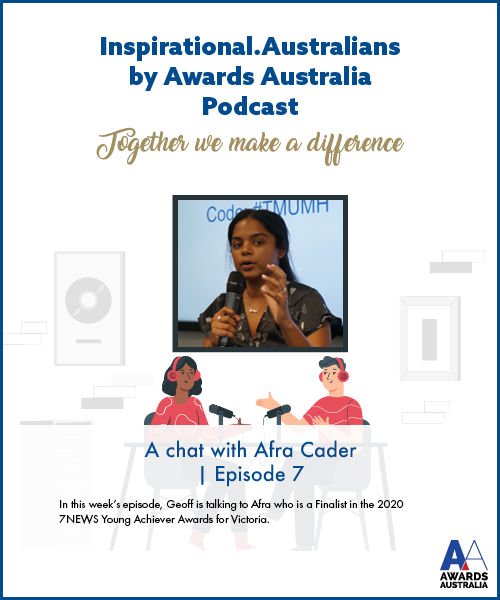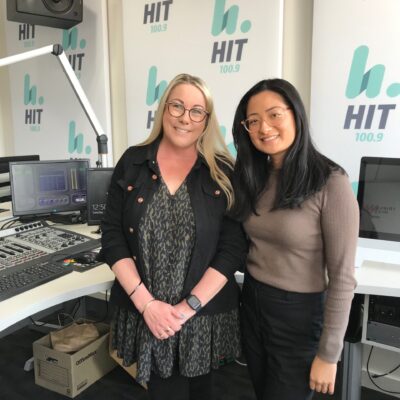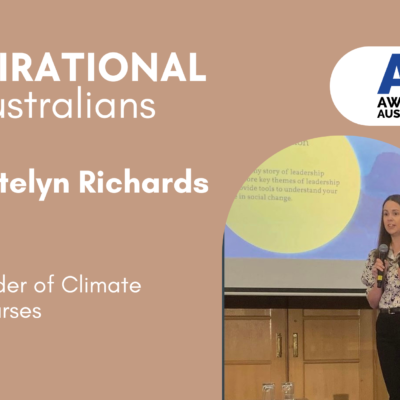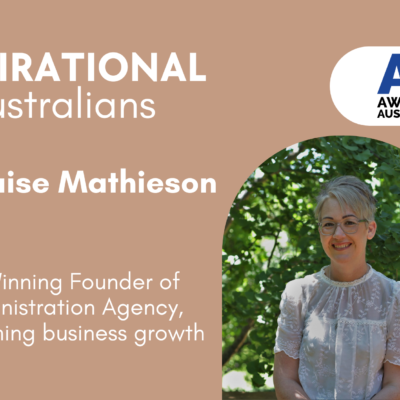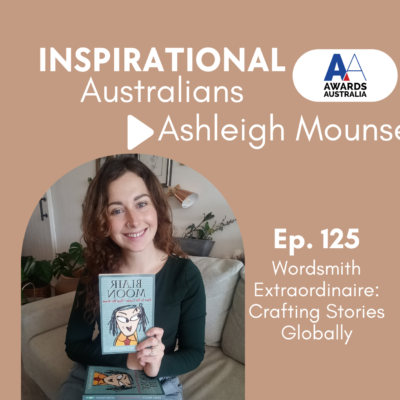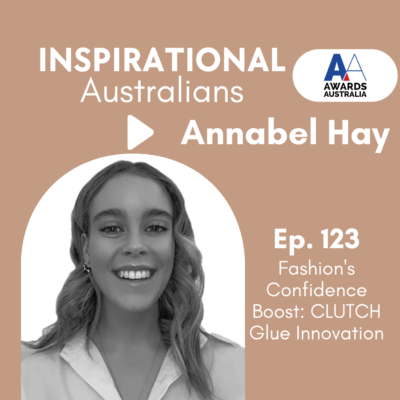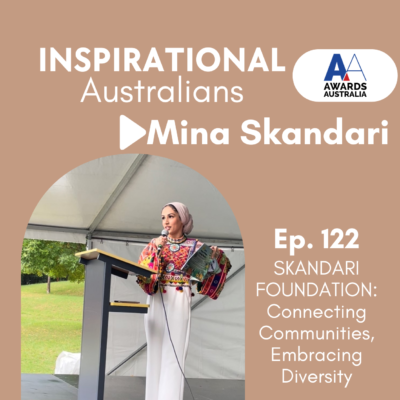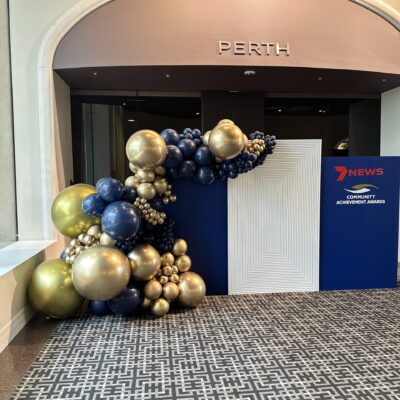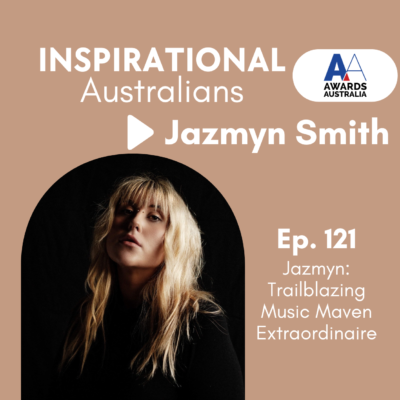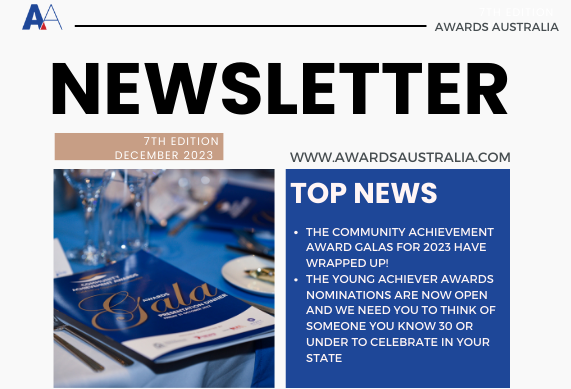In this week’s episode, Geoff is talking to Afra who is a Finalist in the 2020 7NEWS Young Achiever Awards for Victoria.
Afra is a Social Entrepreneur and Management Consultant born in Sri Lanka, raised in Bahrain and living in Melbourne. After working across the 3 countries by the age of 18, and then experiencing the shortcomings of a high performing environment she founded Impact Path, an organisation that aims to combat burnout among young professionals, and she has committed to using her career to drive social change.
Since then, Afra has founded one of the first international Graduate Mental Health seminars, has been selected to work with the UN and is an international published author on gender equality. She was recognised as one of PwC Australia’s top 10 leaders in Diversity & Inclusion, an FYA Young Social Pioneer and a Finalist for the 7NEWS Young Achiever Award.
In this episode:
- Hear Afra’s incredible journey and the impact she is now making
- Afra talks about moving across the world at the age of 18 and the impact it had on her
- Hear what it meant to be nominated and then be judged as a Finalist
Links
Follow us on our Inspirational.Australians Instagram Page
Want to nominate someone? (It can take as little as 2 minutes to recognise someone making a difference)
Like some more information on Corporate Partnership?
Transcript
Annette:
Welcome to the inspirational Australians podcast, where we chat to people, making a difference in their communities and in the lives of others. And here is your host for today, Geoff Griffin
Geoff:
My guest on the podcast today is Afra Cader. It’s such an honor to have you on the podcast today Afra, thanks for joining us.
Afra:
Thanks for having me.
Geoff:
You’re a current 2020 finalists in the 7NEWS Young Achiever Awards for the Bridge Create Change category and that’s for your commitment to making social change. Congratulations for all you’re doing for making the finals. It’s such a shame that the, all the awards across the country have all been postponed and they’re in many of our finalists like yourself who are hanging in there waiting for the big announcements which have been put off. So thanks for your patience. Afra at 18 years of age, you had already lived in three countries. Can you give us a little bit of an insight into those first 18 years?
Afra:
Of course Geoff and thank you so much for having me here today. So basically I am Sri Lankan by nationality and I was born in Colombo and then at the age of three months flew back to where my parents were living in Bahrain in the middle East. And basically the first 18 years of my life, I spent between the two countries. So I went to school – international school in Bahrain. Pretty much thrice a year, every couple of months would jump on a plane and go to Sri Lanka and see my family there. So it was this constant balancing between different cultures, different countries, different types of people. And then at the age of 18, moved to Melbourne, on my own for university. Um, so very, yeah, international, and it was amazing in the way that my school had 64 different nationalities. So my norm was almost being around different people and it kind of set me up really well. Um, yeah moving to Australia.
Geoff:
Did you find that must have matured you at a very young age having to fend for yourself?
Afra:
I think that’s such a great point, Geoff and I look back at it actually, and I just looked back, I guess, at the work that I’ve done and my experience. And it’s really interesting because as a young person having to move here at 18, when I didn’t really have my identity figured out or who I was, I had to grow up really fast. And I feel like that in itself wrote a lot of experiences, whether it was mental health, diversity inclusion, employment, it kind of brought that forward. So I almost experienced what people, what young people face at the younger age. And I feel like that’s kind of what’s propelled me forward to be such, um, a change maker and having experienced, um, yeah, I guess the difficulties of all those three paradigms.
Geoff:
Yeah. But it would have been tough. It’s tough for any young person growing up, not to have your family there at times that you might’ve needed them. You know, just for that high goal, a bit of moral support that we need sometimes, um, would have been tough, but you’re an amazing young woman and it has, It really has helped you forged a path for others to help others say all power to you. Congratulations. I just find that extraordinary, extraordinary in itself. So well done to you. They’re experiencing firsthand the significant toll that a high pressure position can have on someone you found that impact path, which helps combat career burnout in young people. What motivated you and what are some of the benefits it provides for young people?
Afra:
Yeah. So this is one thing that’s really close to my heart, Geoff. So when I moved over to Australia, I was very throughout university at a commerce degree, very set on my career, what I wanted to do. And I was always chasing this external facade of success. And what I didn’t realize was as I started my first job, my need to be approved by others, they’re getting promoted working in high-performing environment. It was all encompassing and it took away from who I was and it started impacting my mental health, my physical health, my relationships, um, and as a young person in the workforce, I didn’t really know who to talk to. I didn’t, I didn’t know anyone else experiencing this and it, I guess for about a year, it was just really struggling. And then I remember going in going to the doctors and speaking to him, and normally the questions were based around my physical health and how I was doing.
And I think the real differentiating point here was he asked about my mental health. And as he went through a couple of questions, he sat me down and he was like, you’ve got burnout. And I was 24, had my dream job, lived with amazing friends and everything seems so great on the outside. Now, it’s just, it’s such a disconnect. I’d not really heard the term before. I didn’t really know what to speak to who to speak to or what to speak to anyone about. And I kind of just went about my ordinary life after that. And then gradually started realizing as I started having conversations with other young people, that this is something that so many people are facing, but there’s no space to bring people together, to have a conversation about what’s important to them about their career. Um, and just how delicately intertwined those two things are.
Um, and basically what we’re doing at Impact Path is creating a safe space for young professionals to come together. And it’s still very much in its early stages. And during COVID actually we’ve run a couple of workshops with people from a couple of law firms, professional services, high performing environments, just to bring them together. And I think the biggest thing that I’ve taken away from it is just the power of peer mentoring and that so many of these young people have the answers within themselves, but not the space created for them to access that. And that’s what we’re really about and what I’m really excited to keep creating with Impact Path.
Geoff:
It’s so important. It’s really awesome. And it is a trap, isn’t it? You just want to be successful, particularly for a high powered organization. You would feel the pressure to perform and as a young person growing up, I’m sure you really felt the need to perform, particularly without your parents always being there. And for you, I can just see how it would have, it would have been a self-propelling situation day by day. You just want to be better and better and have other people that you can talk to understand you’re in the same boat with certainly how do you mend that? How do you get that balance? And just think what you’re doing is fantastic. You also started recently of course founded one of the first international graduate mental health seminars, and you were selected to work with the UN. That must have been really exciting.
Afra:
Yeah, it was awesome! And I feel like it kind of, um, when I think about kind of the work I do in the work in social change, it’s really interesting. Cause one thing I get, I guess, a bit nervous about is it doesn’t fit into one box. So there’s not one category that I’m like, yes, this is what I do. I think when I look at it as a whole, I’m just like, I have gone through certain experiences as a young person and having gone through some pretty dark moments. I’ve used that as a way to propel me forward to make sure other people don’t have to face it. I don’t face it alone. And, um, yeah, the first International Graduate Mental Health Forum was actually so with PWC, um, and basically yeah, through my experiences, through speaking to people and through their amazing support with mental health, um, I just realized the conversation with grads need to start earlier.
And people come into the workforce, don’t know who to speak to don’t know what the language is around it. And I was like, why don’t we bring upon a, why don’t we get someone young to get up and speak from day one from when they come into their careers. And we had grads from Australia and New Zealand. Um, and I was up there talking with incredible partner about her journey with mental health and just really normalizing it and like reducing the stigma from day one, which then I think what excited me the most is that I was in, I remember in the room with all these graduates and I’m like the hearing and meeting us for the first time and the magic and what they’ll take away from this, isn’t going to be right now. It’s going to be when they’re working late on a project or when they’re stressed or something’s going on at home.
And they have an extra tool in that toolkit in terms of how to deal with it, or if someone to speak to. And that’s, that’s what really excites me. Cause I always think about the power of yeah, like mental health, preventative mental health, and it’s setting people up to live like a values aligned and powerful life and that’s thing that they can carry with them their entire career. And that that’s what really excites me. Um, and I guess touching on the second point with the UN it’s actually taking place right now, I’m doing the trainings after work, um, this week. And it’s basically working with the UN Center for Counter Terrorism to basically bring in young people and just get a conversation started about that just in terms of people feeling a bit isolated online, how they can connect in with people and just such a fantastic opportunity to bring young people into the UN. Um, so yeah, I’m very excited for where that, where that that’ll go.
Geoff:
That’s absolutely brilliant. Being able to share your story with others, talk about your problems, you know, that may be related to burn out or the amount of hours or the pressure, whatever it is, and sharing your story personally is really inspiring to open yourself up and be vulnerable like that is difficult, but powerful. So all power to you. Well done. you know, I, I take my I’m really inspired by you and what you are doing for all of our listeners tonight, the rest of so many young people like yourself out and about in Australia, making a massive and powerful difference. It is really important for us to know that we’re in good hands. So thank you. Just changing pace for a moment. What’s something that we might not know about Afra.
Afra:
That’s a great question. Um, I, Oh, I, I love to travel, um, and I love dogs and when I, whenever I go on walks, I actually, um, get very distracted by other people’s dogs and end up talking to them and sometimes get weird looks from the owners. But so like so valuable because the dogs end up walking next to me makes me feel like I have a pet in my life. So that’s a fun, fun slap tightly weighed fact about me.
Geoff:
Oh, you’d get on well with my son, he’s always going up to people’s dogs and for a pat and often people will say, Oh, normally the dog doesn’t like people, it will growl, but my son just has a thing that like you with animals.
Afra:
I see so happy when they say that I’m like, I have special animal powers. Okay.
Geoff:
Okay. Uh, you better start a, um, uh, a foundation for befriending animals as well as something. Um, but also our listeners might not know that you’re an internationally published author on gender equality. Can you tell us a bit more about that?
Afra:
Yeah, sure. Um, I think over the past years, I found is a way to, I guess, communicate experiences of people from diverse backgrounds in a way. So it’s almost an experience that other people might not have an insight to. And for such a long time, I was like, I don’t know how to communicate this powerfully or get, get a large reach for people. And then, um, yeah, I, I just remember there was a, um, I think it was about a year ago, there was a post about, I think it was a Carlton football club, um, a female footy player and there’s a photo that went viral about a little girl cheering her on. And it was just in that photo. Like what was captured was just the potential for when we give women and people from diverse backgrounds, equal opportunity, equal playing field. And I saw that and it really like triggered in me the statement – you can’t be what you can’t see. And I basically had this moment of flipping it to be like, be what you can’t see. And like my whole life, that’s exactly what I’ve had to stepping into leadership positions, into companies, into places where people like me haven’t been before. So I’m constantly creating that narrative and I’m like, that’s really inspiring to me, but I’m like, how do I pass that message on to people? And I actually spent one weekend just like writing it, put it down in an article. And then through that one thing led to another, I got picked up by PWC, financial times in Sri Lanka. Um, and yeah, ever since then, whenever I come across a strike gold with kind of like an idea that I’d love to communicate to people, um, I just love writing and I find the power of it is that it tells a story and connects to people wherever in the world you are. And that’s something that’s really special.
Geoff:
Yeah. That is extraordinary and very powerful. And I’m sure your success is by putting your passion and your whole self into whatever you’re saying, whether it be visually or in writing. So yeah. So, so powerful and well done to you and as I say, opening yourself and sharing your story, um, really connects people so well done to you. I just want to make a little plug because we’ve got a Regional and Community Achievement Awards currently open for nominations right now that is in every state and territory and the Young Achiever Awards open again in October. Afra, we know people like you don’t go looking for accolades or pats on back, but why would you encourage our listeners to nominate someone they know that it’s making a difference a little bit like you are?
Afra:
I think that’s a great question Geoff. Um, and I, as I reflect on that, it’s exactly what you said when people go about their everyday life and not doing things they’re passionate about to serve people. Um, they don’t do it for the recognition, but having, yeah, just like I remember when I got the email, I was just blown away, like it’s such a beautiful gesture to pass on. And I think for me, the reason this has been so special and just, I guess the way that I carry myself and in everything I do, it’s like, I even like underneath all the awards and everything I’m doing, I’m still a human being, right? Like I like, I’m a daughter, I’m a friend, I’m a sister. And it’s like, I think the most powerful, like the powerful part about awards is like connecting to the person behind it and knowing that if you nominate someone, you can literally like make their day, it’ll make their year in this case. But in the same way, when you have people looking to leaders who they can relate to, you know, and people who they can see themselves in it can then encourage more people to step into what they care about and know that they can be themselves. And I think, um, that’s, if I think about just all the opportunities that Award Australia has been so great with over the past couple of months, like it’s just to being in that and just knowing that just because I’m on this podcast with you, Geoff, but doesn’t mean that someone listening can’t be here next year, the year after, and just really encouraging them to step in and do what they care about, you know?
Geoff:
Yeah. Fantastic. Thank you so much. You know, that validation that you’re talking about it and encouragement by someone making a nomination on someone else’s behalf is so powerful. I see year after year, people like yourself, you know, and we think that people who are high achievers they’re invincible, infallible, or superhuman, they don’t have feelings, but everybody ancient said does. And to get an unsolicited acknowledgement is really important. We look for it, but we really appreciate it. We all appreciate it, Thanks. And if any, about listeners would like to nominate someone head to awardsaustralia.com and check out the categories or you’ll see our phone number and give us a call. It is so important, receive thousands of nominations every year, and it really does make a difference when I was 20 years old, that was a while ago. I made a pact to myself because someone had paid me a compliment at a time that I really needed it. And I would have every day of my life pay it forward with minimum five, compliments every day, which I have done every day of my life since that time. And I just find it so important. If you can make one person smile or feel good about themselves, then you know, really lifts your today as well. Nominating someone pays it forward, you will get a aware, but as well as really inspiring and validating someone’s work. So I’m sure for you, it was this lovely to know that someone cared enough about what you were doing to give it that little boost of effort, what other passions that drive you to keep going and achieving such awesome results.
Afra:
Yeah. I love, I love that question. I think, um, it’s been evolving for me through my life and I think, um, especially, I think one of the biggest things is growing up like between the middle East and Toronto, I was just so acutely aware of people based on their, like where the parents from, or the economic development of their country of birth, less in color, how limiting that is to their future. Um, and I just saw basically two different lives of people, incredibly wealthy, lots of opportunities, basically their life set up for them. And then also people because they were born at the wrong time or into a family that didn’t have that much money, how their career trajectory is just so limited. And I think for me, like, because I was constantly dancing between those two worlds, like at a very, at a very young age, as a young girl, I was like that that’s just not okay.
Like, you know, and like I know exactly how lucky I am to be able to move to Australia, live in such a beautiful country, have the opportunities that I do. And I’m like, I can’t live my life in a way that only serves me when I know that not everyone is as lucky as me and I think in the same way. And I still remember this Geoff, when I was filling out the application form and even to a point before, like I’m still humbled genuinely by this award. It just almost takes my breath away because I always can’t believe it, but I just think it’s such an amazing gesture. And I am, when I was writing the award, I was just reflecting on like, what really got me here. Um, and I really think it comes down to like, in some of my loneliest moment or dark times that I’ve just failed or having like, you know, just haven’t been able to do what I wanted to or be around the people I wanted to.
It’s like, I’ve been able to use that in a way to bring people together and basically talk about our shared experience and my personal journey, but not for me. And knowing kind of what you’ve said before in opening that conversation. It brings people, it brings people closer together. And I think your point around compliments as well, like, especially with the news about what’s happening in Victoria yesterday and everything that’s happening globally. Like there hasn’t been more, an important time to connect in with people and have that conversation. And for me, I just want to leave everyone that I meet, like knowing that they’re heard and they’re seen as who they are. And that’s pretty much the most important thing that kind of makes me up in the morning and keeps me going.
Geoff:
That is fantastic. And you’re right. It’s a pretty tough for the Victorians at the moment. And just to get some nice words from people, you know, which is really important at this shot right now at this time. And of course the Lifeline is there for anybody who needs to talk to someone and doesn’t have anybody that they feel comfortable to talk to. And the number from memory is 13 11 14 and if you’re feeling low, we all do from time to time, give Lifeline a call. Um, if you need, they’re not judgmental, they’re just there to talk. So Afra, why do you think the world needs more of right now?
Afra:
I think compassion, Geoff. I think as well, this starts with us individually. And if I reflect, yeah, just in terms of isolation in COVID, conversations I’ve had with people, I think one of the most difficult things is just being in the silence and sitting with ourselves. And I think it kind of brings thoughts of feelings or previous experiences that in the past of being able to kind of do other things with them to get. And I think the most important thing is compassion, but compassion for other people start with themselves. And it’s like, if you go through a hard time, like this morning, for example, I woke up and I felt incredibly anxious and actually before getting on this call, Geoff I was, I was acting really nervous, like genuinely. Um, now I just sat there and I was just like, what, like, what do I need? And what does the world need right now? Compassionate being okay with the feelings that you’re having, allowing yourself the space to process it. Then also to your point around the conversation. Like it’s not that we’ve needed more right now. So just picking up the phone and having a conversation with someone, just showing, caring, compassion, I think that’s such a long way.
Geoff:
Well, they don’t say I’m nervous and apparently if anybody could see you’re beaming smile right now as I can on our Zoom. Uh, it would never come across that way, but you know, it just goes to show that we’re human. We all feel nervous, anxious at various times and that’s okay. But to be able to be strong and overcome that as you have in so many ways and putting yourself out there, share your story. As I said before, to help others is extraordinary and we can all do our part no matter how big or small that may be, if a little bit helps and you’re right. Compassion and kindness so important and today as well. And there’s just not enough going around. So the more we can give the more it will help. So, um, right. I think that’s absolutely brilliant. So what is next for Afra?
Afra:
Great question. It’s one I’m forever asking myself. Um, I think on a personal lens, as soon as the borders open, I want to get a van and drive through Australia very much itching to go traveling. Um, in terms of the work that I’m doing, um, yeah. Continuing to build out Impact Path. Um, yeah. And just, I guess, a call out for listeners, if you’re a young professional or young person in the workplace and interested in yeah. In what we do or basically holding a safe space, be more than happy to have a conversation around that. I actually don’t think there’s a time that we needed to hear that more in terms of redundancies in terms of us going into the next stage of lockdown. Um, and then, yeah, I guess as well, this is completely side note, but one thing I’m very excited in is kind of like increasing, like the writing and the poetry that I do. And I’m kind of infusing it with storytelling and seeing how we can kind of bring communities together, especially at a time like this, through the power of the creatives and storytelling and art. So that’s something I’m very excited about.
Geoff:
Sounds awesome. Can’t wait for the next chapter of Afra Cader. Yeah. Sounds exciting. You’re an amazing young person while on that topic, how do listeners connect and find out more about what you’re doing?
Afra:
That’s a great question. I think for me, um, the best way to get in contact would be through LinkedIn. That’s kind of my, um, the profile that I have. So you can just type in, Afra Cader into LinkedIn and very, very rare name, I think there’s only one of main Australia. Um, and you can connect with me on that. Um, and I’m always like open and willing to have a conversation with new people. So don’t hesitate to reach out. Um, I’d be more than happy to have a chat.
Geoff:
Please do. You could do a lot worse than speak to Afra. She is amazing. And it’s, uh, A F R A and it’s CA D E R. If anybody wants to look up Afra on LinkedIn, now what’s the one piece of advice you would leave our listeners with.
Afra:
Ooh, this is a great question. Um, I think the one piece of advice I’d leave the listeners with is spending the time to really get present to what you want to create in your life. Cause I think so much of the time we’re an overdrive and we’re busy and we’re trying to reach this vision of success that might not even align to what we want to do. Um, so the one thing I’d leave you with is carving whether it’s 10 minutes, half an hour out of your day, to just really reflect on what you want to create in your life. And I actually think having COVID as a reset button in a way is such a beautiful opportunity. Um, and I think that for me, especially during this time has been really helpful. So yeah, creating an intentional space and reflecting on what’s important to you is what I’d leave the listeners with.
Geoff:
I absolutely love that because we can get a little caught up in trying to make a difference for others and forgetting about ourselves. And if we get left behind, it becomes a lot harder to be the difference for others. So I love that. Um, take that on board, everybody that is perfect. Really brilliant! Afra, thanks so much for being our inspirational Australian podcast guest today. You’ve all enjoyed my chat with Afra today. All of the links from today’s podcast will be in the show notes on our website at awardsaustralia.com/podcast. Thank you so much Afra, it’s been really wonderful to talk to you.
Afra:
Thank you, Jeff and Annette and everyone at awards Australia. It’s been a pleasure to be here today.
Geoff:
Thank you until next time, stay safe and well, and remember your act of kindness for someone could be the difference. I hope you enjoyed today’s interview as much as I have. We would love you to subscribe to our podcast so that you won’t miss an episode. Join us each week, as we talk with ordinary Australians achieving extraordinary things. Did you know that awards Australia is a family owned business that proudly makes a difference in the lives of those that make a difference for others. And we thank our corporate and not for profit partners to making our awards programs possible. Do you know someone that’s making a difference or maybe your business might like to sponsor an award, contact us through our Instagram page, inspirational.australians or head to our website awardsaustralia.com. It would be great if you could share this episode with your network because who doesn’t like a good news story and please rate and review us. We would really love to hear your thoughts until next week, stay safe and remember together, we make a difference.
Annette:
Thanks for joining us today on the inspirational Australians podcast, we hope you enjoyed listening and have been inspired by ordinary Australians, achieving extraordinary things. So it’s goodbye for another week. Remember together, we make a difference.


